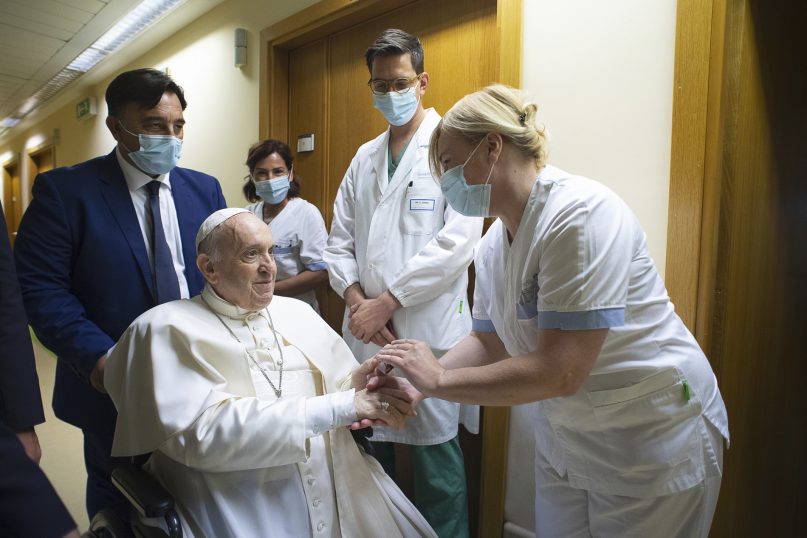VATICAN CITY (RNS) — Pope Francis’ first foreign trip since his recovery from surgery will be to the Eastern European countries of Hungary and Slovakia from Sept. 12-15. While Slovakian citizens eagerly anticipate the papal visit, the ongoing COVID-19 pandemic continues to generate conflicts and challenges.
The Slovakian state has announced it will restrict the papal events to only fully vaccinated people. “There was a debate because the church asked that unvaccinated people may also attend,” said the Rev. Martin Kramara, spokesperson for the Slovakian episcopal conference, during an online event with Vatican reporters on Wednesday (July 28).
Protests and public debates against COVID-19 restrictions have taken hold of the country, where more than 12,500 people have died from the virus or related causes since the start of the pandemic, according to data from the World Health Organization.
On Friday, hundreds of protesters opposing government regulations to prevent the spread of the pandemic clashed with police forces in front of the entrance to the Slovakian Parliament. According to data from Johns Hopkins University, the country has the lowest vaccination rate in the European Union, with only 35% of the population having received the vaccine.
The local government gave the bishops a choice: Either the papal events would be limited to people who received the vaccine, or a maximum number of 1,000 people could attend with or without the vaccine. The bishops decided to allow for wider participation with the prerequisite of having received the vaccine, but Kramara explained this has led to a significant logistical challenge for the local church.
The bishops are working to create a digital system for access through a personalized authorization code. When St. Pope John Paul II visited Slovakia in 1995, only two years after the country officially separated from the neighboring Czech republic and freed itself from the grip of communist rule, there were no limitations on the number of people who could flock to the papal events, Kramara said.
Today, in light of the COVID-19 pandemic, the priest said screening access to the events has become “the greatest challenge” for organizers. He also spoke of “information chaos” that has taken hold of the country, especially on social media, which has led to vaccination hesitancy and skepticism.
“People are looking for a fixed point, someone they can trust,” Kramara said, adding “the Holy Father’s encouragement gives us hope.”
Despite the hardships and tensions in the country, there is “great enthusiasm” for the papal visit in September, Kramara said. “The entire country is already talking about it. There is talk of the pope but also of the Lord,” he said. “Whether you like it or not God has become a topic of conversation.”
RELATED: Grueling itinerary set for pope’s first post-surgery trip
Pope Francis will arrive in the Slovakian capitol of Bratislava on the afternoon of Sept. 12 ,where he will attend an ecumenical gathering and then meet with the local Jesuit community. His trip, which includes a flurry of events and public speeches, will engage with both the political and the religious representatives in the country.
The pope will also visit charity centers working with the Roma population and the unhoused. “His Holiness asked for the possibility of meeting the people who are not at the center of attention in the country,” Kramara said, adding that this led to organizing a papal visit to the small Bethlehem Center in Bratislava dedicated to the poor and homeless on Sept. 13.
“The nuns there care for the people and children who don’t have the best conditions of assistance,” the priest explained.
Roughly 66% of the Slovakian population is Catholic, with a minority adhering to the Greek Orthodox Church. But according to Kramara, the small country is faced with “the challenges of the Western world,” especially a growing secularism that has emptied pews and shrunk the number of religious vocations.
The excitement of the Slovakian faithful for the pope’s apostolic visit is also apparent from the prayer marathon — scheduled to take place Aug. 7 to Sept. 15 — before and during his arrival. Local bishops hope rosaries and prayer will help the local faithful and nonfaithful alike to be more receptive to the pope’s words during the trip.
“I ask everyone to start preparing internally to be able to listen well to the message of Pope Francis,” said the president of the Slovak Bishops Conference, Archbishop Stanislav Zvolenský, in a statement July 4. He expressed hope that Francis’ visit will encourage a “great spiritual strengthening.”
Kramara said the pandemic has contributed to a feeling of “discouragement” in the country, with many losing family members to COVID-19 and faithful not being able to attend Mass in church. “Right now we need to not lose hope,” he said, adding he believes the pope’s visit “will bring the presence of Jesus Christ among us.”
RELATED: Vatican real estate deal trial gets underway with defense on the attack





